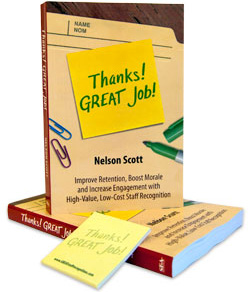-
Why did the author write this book? What seemed to be his purpose or motivation?
-
What is the central theme of this book? How does it resonate with you? How is this theme relevant to your work life?
-
What was the most significant part of this book for you? What passage or section made an impression on you, good or bad? Why did it make an impression?
-
How did Thanks! GREAT Job! change how you think about staff recognition? Or, how did it confirm what you already believed about staff recognition?
-
In arguing that recognition must be Genuine, the author writes, “Recognition that is insincere — given because it is the ‘thing to do’— or offered to an undeserving recipient is meaningless and diminishes the credibility of future recognition.” How do you feel about this statement? Have you received or witnessed recognition that you felt was insincere?
-
The author writes that, “Recognition that is Relevant relates to what the organization says is important, and is often expressed in the form of a vision, mission statement, values or goals. Relevant recognition focuses on behaviours that are key to employees’ on-the-job success.” Thinking of our organization, what behaviours could we acknowledge that are relevant to our mission statement, values or goals?
-
How would you describe the author’s feelings about formal staff recognition programs? Do you agree with his point of view? Why or why not?
-
The author writes that, “Frequent and varied informal recognition creates a sound foundation for formal programs. The more informal recognition, the greater the potential for formal recognition programs to be meaningful to the staff. Ironically, the more that informal recognition occurs, the less pressure executives and managers will feel to introduce formal recognition programs in response to staff members’ expressions that they feel unappreciated.” How do you feel about his statement? Can formal recognition programs be effective in a work environment where there is little informal recognition?
-
What evidence does the author use to support the book’s key points? How has he supported his conclusions with facts, observations and personal opinions?
-
Early in Thanks! GREAT Job! the author cites a study by Lawrence Lindahl that shows that what employees wanted most from their jobs was, “appreciation for work done” and “feeling ‘in’ on things.” Other factors such as “good wages,” “good working conditions” and “promotion and growth opportunities” were lower on the list. A critic would note that this research was first published in 1949. What do you think? Are these findings valid in today’s workplace?
-
In Thanks! GREAT Job! the author identifies and dismisses at least 20 reasons that managers give for not recognizing staff as “excuses, rationalizations and cop-outs.” How fair is his assessment of these reasons for not recognizing staff? Which ones stood out the most for you?
-
Often the purpose of management or business books is to inspire readers to take action. What, if any, action do you plan to take as a result of reading Thanks! GREAT Job!
-
Early in the book, the author writes that, “I have included ideas that I couldn’t imagine using myself, but they have worked for others.” Which techniques did you find in this book that you would never use yourself? Why not?
-
How did this book read? Was it like a story, newspaper article, research project, how-to book, lecture, rant or something else?
-
Non-fiction books can be pretty dry stuff, or they can be fun to read. Which describes this book? How could the author have “spiced things up?” How could he have made the book more accessible or easier to read?
-
If you knew that the author was planning a second edition of this book, what changes would you suggest? How could he improve Thanks! GREAT Job!




